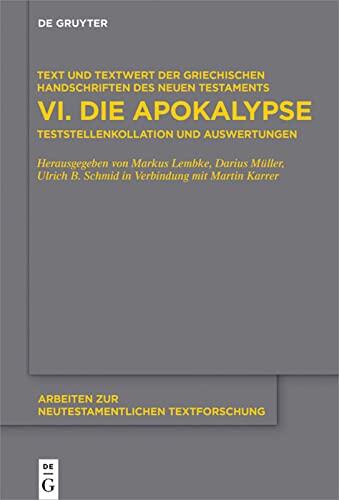
Die Apokalypse
まだ評価がありません
Dystopian
History
形式
ハードカバー
ページ数
941
言語
ドイツ語
公開されました
Jun 26, 2017
出版社
De Gruyter
版
1
ISBN-10
3110547287
ISBN-13
9783110547283
説明
The work delves deeply into the themes and narratives surrounding apocalyptic literature, particularly focusing on texts from the New Testament. Written by Markus Lembke, Darius Müller, and Ulrich B. Schmid, this comprehensive study provides a detailed examination of the context and significance of apocalyptic messages within biblical writings.
Spanning 81 pages, the introduction lays a robust foundation for understanding the complexities of apocalyptic themes, presenting key concepts in both German and English. This dual-language approach ensures accessibility for a wider audience, enhancing the dialogue around this pivotal aspect of biblical studies.
Scholars and students engaging with the field of New Testament text research will find extensive bibliographical references to support further exploration. The authors combine rigorous academic analysis with interpretative insights, making the work a valuable resource for those interested in theological studies, eschatology, and the historical impact of apocalyptic thought.
Ultimately, this text invites readers to reflect on how apocalyptic literature shapes perceptions of hope, judgment, and the future within the Christian tradition. It stands as a significant contribution to ongoing discussions in biblical scholarship, encouraging a reevaluation of how these ancient writings resonate with contemporary audiences.
Spanning 81 pages, the introduction lays a robust foundation for understanding the complexities of apocalyptic themes, presenting key concepts in both German and English. This dual-language approach ensures accessibility for a wider audience, enhancing the dialogue around this pivotal aspect of biblical studies.
Scholars and students engaging with the field of New Testament text research will find extensive bibliographical references to support further exploration. The authors combine rigorous academic analysis with interpretative insights, making the work a valuable resource for those interested in theological studies, eschatology, and the historical impact of apocalyptic thought.
Ultimately, this text invites readers to reflect on how apocalyptic literature shapes perceptions of hope, judgment, and the future within the Christian tradition. It stands as a significant contribution to ongoing discussions in biblical scholarship, encouraging a reevaluation of how these ancient writings resonate with contemporary audiences.